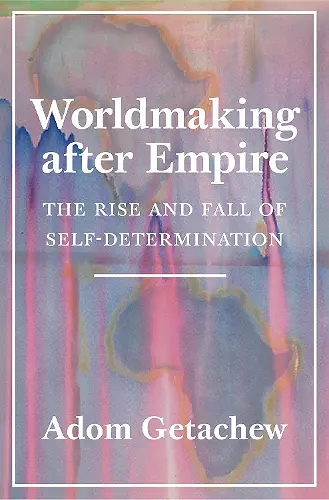Worldmaking after Empire
The Rise and Fall of Self-Determination
Format:Hardback
Publisher:Princeton University Press
Published:26th Feb '19
Should be back in stock very soon
This hardback is available in another edition too:
- Paperback£25.00(9780691202341)

Decolonization revolutionized the international order during the twentieth century. Yet standard histories that present the end of colonialism as an inevitable transition from a world of empires to one of nations—a world in which self-determination was synonymous with nation-building—obscure just how radical this change was. Drawing on the political thought of anticolonial intellectuals and statesmen such as Nnamdi Azikiwe, W.E.B Du Bois, George Padmore, Kwame Nkrumah, Eric Williams, Michael Manley, and Julius Nyerere, this important new account of decolonization reveals the full extent of their unprecedented ambition to remake not only nations but the world.
Adom Getachew shows that African, African American, and Caribbean anticolonial nationalists were not solely or even primarily nation-builders. Responding to the experience of racialized sovereign inequality, dramatized by interwar Ethiopia and Liberia, Black Atlantic thinkers and politicians challenged international racial hierarchy and articulated alternative visions of worldmaking. Seeking to create an egalitarian postimperial world, they attempted to transcend legal, political, and economic hierarchies by securing a right to self-determination within the newly founded United Nations, constituting regional federations in Africa and the Caribbean, and creating the New International Economic Order.
Using archival sources from Barbados, Trinidad, Ghana, Switzerland, and the United Kingdom, Worldmaking after Empire recasts the history of decolonization, reconsiders the failure of anticolonial nationalism, and offers a new perspective on debates about today’s international order.
"Winner of the Frantz Fanon Prize, Caribbean Philosophical Association"
"Winner of the ASA Best Book Prize, African Studies Association"
"Winner of the First Book Award, Foundations of Political Theory Section of the American Political Science Association"
"Co-Winner of the W.E.B. Du Bois Distinguished Book Award, National Conference of Black Political Scientists"
"Co-Winner of the J. David Greenstone Book Prize, Politics & History Section of the American Political Science Association"
"Winner of the ISA Theory Best Book, Theory Section of the International Studies Association"
"One of Foreign Affairs' Best Books of 2020"
"It’s been a bad decade for politics, but a great decade for political theory. Three standouts for me were Shatema Threadcraft’s Intimate Justice, Adom Getachew’s Worldmaking after Empire, and Kathi Weeks’s The Problem With Work."---Amia Srinivasan, The Chronicle of Higher Education
"[A] marvellous book . . . tracing a new narrative of the nature and significance of anti-colonial thought and politics over the middle decades of the 20th century. Challenging the standard view of decolonisation as a moment of European-style nationbuilding, Getatchew offers instead an account of anti-colonial theory and practice as "worldmaking"."---Jonathan Egid, New Humanist
"
A compelling look at how Black internationalist thought evolved throughout the postcolonial period and how its successes and failures . . . continue to shape global politics today.
"---Jennifer Williams, Foreign PolicyISBN: 9780691179155
Dimensions: unknown
Weight: unknown
288 pages